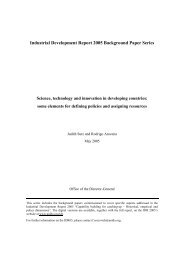Manual on the Development of Cleaner Production Policies ... - Unido
Manual on the Development of Cleaner Production Policies ... - Unido
Manual on the Development of Cleaner Production Policies ... - Unido
You also want an ePaper? Increase the reach of your titles
YUMPU automatically turns print PDFs into web optimized ePapers that Google loves.
DEVELOPMENT OF CP POLICY<br />
MODULE 1: INTRODUCING CP<br />
(c) Life-cycle analysis, c<strong>on</strong>ducted for a whole product ra<strong>the</strong>r than specific stages <strong>of</strong> producti<strong>on</strong>. A<br />
complete review is carried out <strong>of</strong> a product’s impact <strong>on</strong> <strong>the</strong> envir<strong>on</strong>ment, from <strong>the</strong> extracti<strong>on</strong> <strong>of</strong><br />
<strong>the</strong> raw materials to its final dispositi<strong>on</strong>; when this is d<strong>on</strong>e using cost as a comm<strong>on</strong> denominator,<br />
it is known as life-cycle costing;<br />
(d) Design for envir<strong>on</strong>ment, which means incorporating envir<strong>on</strong>mental c<strong>on</strong>siderati<strong>on</strong>s into <strong>the</strong> design<br />
<strong>of</strong> a new product or facility; and<br />
(e) Sustainable enterprises, based <strong>on</strong> integrated ec<strong>on</strong>omic, envir<strong>on</strong>mental and socially-resp<strong>on</strong>sible<br />
company management.<br />
In summary, it should be underlined that <strong>the</strong> differences between <strong>Cleaner</strong> Producti<strong>on</strong>, polluti<strong>on</strong><br />
preventi<strong>on</strong>, waste minimizati<strong>on</strong>, waste preventi<strong>on</strong> and eco-efficiency are, for all practical purposes,<br />
minimal. Each c<strong>on</strong>cept shares a comm<strong>on</strong> emphasis <strong>on</strong>:<br />
(a) The simultaneous achievement <strong>of</strong> ec<strong>on</strong>omic and envir<strong>on</strong>mental benefits;<br />
(b) The integrati<strong>on</strong> <strong>of</strong> envir<strong>on</strong>mental management into mainstream management practice;<br />
(c) The applicati<strong>on</strong> <strong>of</strong> an integrated, preventive envir<strong>on</strong>mental strategy to producti<strong>on</strong> processes as<br />
well as to products throughout <strong>the</strong>ir life cycle;<br />
(d) The minimizati<strong>on</strong> <strong>of</strong> risks to human health and <strong>the</strong> envir<strong>on</strong>ment;<br />
(e) The sustainable use <strong>of</strong> natural resources.<br />
In o<strong>the</strong>r words, CP is about achieving <strong>the</strong> same producti<strong>on</strong> output with less inputs (materials and<br />
energy) and c<strong>on</strong>sequently with less polluti<strong>on</strong>. The applicati<strong>on</strong> <strong>of</strong> <strong>Cleaner</strong> Producti<strong>on</strong> can significantly<br />
improve <strong>the</strong> resource efficiency and envir<strong>on</strong>mental performance <strong>of</strong> existing producti<strong>on</strong> processes, with<br />
no or little investment in <strong>the</strong> first stages. It does not obviate <strong>the</strong> need to upgrade or replace old<br />
equipment; similarly, although it reduces <strong>the</strong> requirement for end-<strong>of</strong>-pipe treatment facilities, it does<br />
not entirely eliminate it. In c<strong>on</strong>trast to end-<strong>of</strong>-pipe polluti<strong>on</strong> c<strong>on</strong>trol, CP and preventive approaches do<br />
not take as a given that polluti<strong>on</strong> must be generated and <strong>on</strong>ly <strong>the</strong>n treated. Ra<strong>the</strong>r, preventi<strong>on</strong> is <strong>the</strong><br />
first step, instead <strong>of</strong> damage c<strong>on</strong>trol.<br />
http://www.unido.org/doc/331390.htmls<br />
SLIDE: CP—three comm<strong>on</strong> misc<strong>on</strong>cepti<strong>on</strong>s<br />
1. CP is not restricted to industry or to producti<strong>on</strong>; it has been<br />
successfully applied in <strong>the</strong> service sector and in municipal programmes;<br />
2. CP is not an exclusively technical c<strong>on</strong>cept, i.e. it is not <strong>the</strong> equivalent<br />
<strong>of</strong> ‘Clean Technologies’. CP involves a change in attitudes and<br />
management practices, <strong>the</strong> applicati<strong>on</strong> <strong>of</strong> available know-how and <strong>the</strong><br />
improvement or modificati<strong>on</strong> <strong>of</strong> technologies.<br />
PAGE 21
















